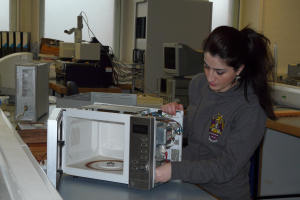Manchester student takes her research to Parliament
08 Mar 2012
A University of Manchester engineering student is attending Parliament next week to present her science to a range of politicians and a panel of expert judges.

As part of SET for Britain on Monday 12 March, Azadeh Dindarian, an Electrical and Electronic Engineering PhD student, will present her research poster to be judged against dozens of other scientists in the only national competition of its kind.
This work is co-authored by her supervisor, Professor Andrew Gibson, and Dr Joao Quariguasi Frota Neto.
Azadeh, 29, from Salford Quays, was shortlisted from hundreds of applicants to appear in Parliament on Monday for her research into electronic waste; specifically the 2.5 million microwaves thrown away every year in the UK.
She found that there is an enormous potential for the repair and reuse of microwaves - 85% of these could have been easily repaired or were disposed of for cosmetic reasons,. Her research also looks at the benefits of re-designing microwave ovens to ensure they have a longer life and can be easily reused.
Azadeh said: "Electronic waste is a global problem and I feel privileged to be able to research the subject area.
“I am passionate about finding ways to reduce the amount of waste and my project addresses the possibility of re-using discarded electrical equipment.
“SET 2012 gives me the ideal opportunity to disseminate this message and the possibility of influencing members of parliament who, in turn, could support the relevant proposals for passing legislation to help reduce waste and create a more sustainable economy.
Professor Gibson said: “Azadeh is working on a pioneering research project concerning the sustainability of core materials for the manufacture of electrical and electronic equipment.
“For the first time, a study is underway to look at the quality of disposed electrical goods. The results we have so far obtained are surprising in that the majority of disposed microwave ovens are either fully functional or easily repaired. The hard practical fault-finding data is what makes this project unique.”
Dr Quariguasi Frota Neto added: "There is no reason for throwing away as many microwaves as we do in the UK and elsewhere, and I hope our research helps consumers, manufacturers and governments to understand that."
Andrew Miller MP, Chairman of the Parliamentary and Scientific Committee, said, “This annual competition is an important date in the parliamentary calendar because it gives MPs an opportunity to speak to a wide range of the country’s best young researchers.
“These early career scientists are the architects of our future and SET for Britain is politicians’ best opportunity to meet them and understand their work.”
Azadeh’s research has been entered into the Engineering session of the competition, which will end in a gold, silver and bronze prize-giving ceremony.
Judged by leading academics, the gold medalist receives £3,000, while silver and bronze receive £2,000 and £1,000 respectively.
The Parliamentary and Scientific Committee run the event in collaboration with The Royal Academy of Engineering, The Institute of Physics, the Society of Biology, The Royal Society of Chemistry, the Physiological Society, the Wellcome Trust and the Society of Chemical Industry, with financial support from BP, Airbus/EADS, The Institution of Engineering and Technology, AgChem Access, Oxford Instruments, IBMS and GE Hitachi.
